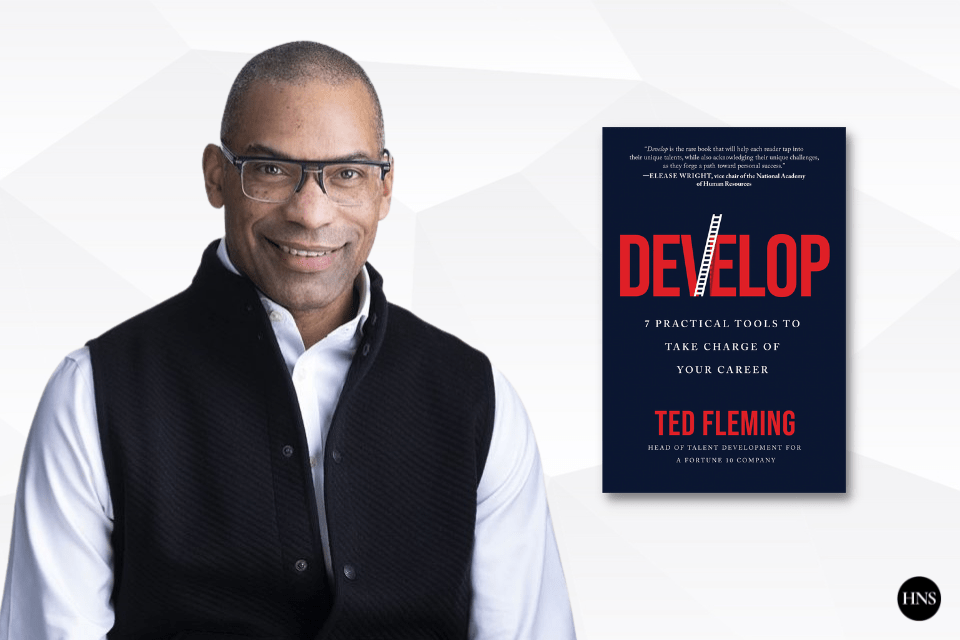This month, HNS partner Karen Kirchner had the honor of sitting down with Ted Fleming, author of the book Develop: 7 Practical Tools to Take Charge of Your Career and former head of Talent Development at CVS Health.
*Responses have been edited for brevity and clarity
Karen: Thank you for taking time to talk to us about your book and share some of the insights you’ve gained from your broad background in banking, management consulting, entrepreneurship, and most recently, Head of Talent Development at CVS Health. When you think about what you experienced through all your different roles, why do you think you did so well in your career?
Ted: It’s going to sound like a cliche, but one thing is being a lifelong learner. I come from a family of teachers, so it was really ingrained in me: “What did you learn today? How are you pushing yourself?” Being truly interested in learning what’s next and expanding my knowledge was really the key to my success. It’s also about building good relationships and delivering good performance.
Karen: One thing we do in our programs is help women define a memorable brand or “superpower” that they can communicate to others. You have lots of different talents and strengths, so what’s the one thing you wanted people to remember you for?
Ted: I know Her New Standard (HNS) does a great job of helping women with branding, which is really important. My label for that is a “towering strength.” It’s what you know you do better than most of the population, and it’s something that others have validated through their feedback. In my case, people come to me when they’re stuck and not sure what to do. Whenever it’s a blank page and they want to start something from scratch, that’s when I get called. It’s fun for me, and that’s another thing about tapping into your towering strength. It’s something you do naturally and that you enjoy. But just because it’s easy, doesn’t mean you should take your strengths for granted. Identify those areas of strength and invest in getting even better so that you can use those strengths at a higher level.
Karen: What’s one hard lesson you learned in your career?
Ted: I really didn’t fully understand the importance of cultural fit when I started my career. I was a commercial banker and was one of the top salespeople, but they weren’t my people. People who love finance and analytics tend to be more conservative, and that wasn’t really my personality. I wanted to be more creative and a little looser, so despite being successful, I was probably in that industry too long because I didn’t recognize the importance of fit. And the higher up you go, the more important the cultural fit is. When they’re making decisions about who’s going to be in senior leadership, they will choose people they feel comfortable with, or who they think fit.
Karen: Sometimes, that cultural fit is hard to achieve–especially when you’re trying to get into the senior echelon and it’s mostly white men. What advice do you have for women and people of color trying to break into the senior level?
Ted: In the book, I talk about the expectation principle. Wherever you go, you want to be in a situation where people have high expectations of you, and you’re able to stretch and meet them. For example, if you get the feedback that “You really knocked that out of the park, and we were surprised,” that means their expectations are too low, and that’s not an environment you want to be in long-term. You want people to tell you where you excelled and where you fell short, and you want to hear, “We can see a future for you here.” So I always advise women and people of color to keep networking and speaking with people until you find that situation where people have those high expectations, as you’re much more likely to advance.
And here’s another important point. I’ve asked thousands of senior leaders to tell me the one thing that they felt really propelled them to where they are today, and 80% of them say the exact same thing: “I didn’t think I was qualified for this particular role, but a mentor or sponsor saw more in me than I saw in myself, and they pushed me to take that role.” This can happen at any level, for example taking over a P&L for the first time, taking over an operation, or working in a functional unit they didn’t know anything about. However, women and people of color are often being held up to the standard of “Have you done this before? Do you have experience and repeated success?” But that’s not how it works at the highest levels. What typically happens is that they like you as a person, they see your talent, and then they give you that opportunity and push you to succeed.
Karen: So what do you do if that’s not happening for you at your company?
Ted: You don’t necessarily need to leave the organization, but you have to find a sponsor or mentor who is going to give you that opportunity, maybe in another business unit or department. If you can’t find that, I don’t want you to become bitter and stay in that same role and be frustrated. I want you to look for that opportunity externally.
When someone is viewed as a high-performing, high-potential leader, their manager tends to push the person.They might say, “I think you need to do this next and then go here, and I think you need this challenge and you need to learn how to manage a cross functional team.” If you’re not viewed as a high-potential, high-performing person, then the conversation sounds more like, “What would you like to do? I’m willing to support you.” It’s not incumbent upon you to give the suggestions because you don’t have all the information and you don’t necessarily know what would be best to propel your career.
Karen: So if you are a high-performer, but you don’t have a boss who’s giving you those ideas of how to develop, it sounds like your advice is to seek out others in the organization who might play that role, or know when it’s time to leave.
Ted: You can find people. My previous organization of 300,000 people had 400 people in the VP plus category, so that’s a lot of people who can be your potential mentors and sponsors. We all have to learn to manage around bad bosses and poor leaders. Ask yourself, “Am I putting in the effort so that other people really get to know who I am and how I can add value to the organization?” If you do that, you should have a much higher probability of someone sponsoring you.
Karen: So that brings us to networking. We find that networking is something we all know we should do, but we tend not to do enough of it, and it’s particularly difficult for those of us who are introverts. What tips do you have for introverts like me who find networking challenging?
Ted: You might not like my answer, but it comes in two parts.
Being an introvert can’t be an excuse. Are you really introverted or are you just nervous about reaching out to people you don’t know? What I tell folks is to start with one-on-one meetings. If you’re introverted, you’re probably much more comfortable one-on-one than going to a big convention or a Chamber of Commerce dinner and speaking with lots of people.
Start by networking with friends and clients and colleagues you’re comfortable speaking with. If you’re not sure what to talk about, have an agenda. Be interested in the person; ask them questions about their job or share an article. I would argue that introverts are actually very well prepared when you think about the real goal of networking, which is to learn from the other person. They’re much more likely to listen, whereas the extrovert may just be thinking about selling themselves. It’s about the exchange of information and building a trusted relationship, so introverts actually have an advantage here.
Karen: That’s a great point. Introverts have gifts that we can bring to the process.
Ted: Absolutely. Also, be creative about networking. One way that I’m networking right now is through an international book club, where I’m speaking with someone who’s a physician in England, someone who owns a pharmaceutical company, someone who works for the government…so think creatively and more expansively about the concept of networking.
Karen: One of the things I love about your book is that you break down developing your career into a 3-part model: Performance, Image and Exposure (PIE) and I’m curious why those three are particularly important for women to focus on.
Ted: The PIE model comes from Harvey Coleman, the author of Empower Yourself. Here’s why it’s important for women, in particular. When I offered leadership development programs, there would be last minute cancellations. I would track it and nine times out of 10, the person who canceled was a woman or a person of color, and the reason they canceled was almost always the same. “I have an important deadline or deliverable that I need to complete.” When you do that, you are making your development less important than the tasks you have to get done.
I think of the PIE model as evolving over time. When you’re early in your career, the first thing you have to do is perform well in your job in order to progress. As we get towards the mid-career level, it’s important to have that image. What do others think of you and what do they think of your leadership style? Do they like you? How would they describe your strengths? And later, when you want to get to the senior-most ranks, it is about exposure. Who knows you? Who knows the value you add to the organization?
It always blows executives away when I tell them the most damning thing I can say about you if I want to undercut your career is, “I don’t know who you are.” That speaks to exposure. The second most damning thing I can say is, “I heard that she isn’t good with the numbers” or “I’ve heard she’s not a good people manager”. They’re attacking your image, and that’s because they haven’t had the direct exposure to you to judge those things themselves. In some larger, more politically intense organizations, people could be out there trying to seed negative comments or thoughts about you. I know that’s very Machiavellian, but it is the truth for certain political environments.
Karen: Let’s say I’m a black woman at a large organization similar to the one you just left, and I have a sponsor who is in the room where talent planning takes place. If this sponsor cares enough to fill me in that there’s somebody sowing seeds of doubt about me, what should I do with that information?
Ted: That’s a great question, and it happens a lot. It’s more intense for women and people of color, but this works for anybody. Have a picture in your mind of what you want your image to be. If you want to be seen as analytical and good at making decisions, then every chance you get, work that into the conversation so you change the picture in their mind. You want to tell stories where you reinforce that image. For example, if you’re doing a new marketing campaign, you can share something like, “I’m in charge of this marketing campaign, and I want you to know that in the marketing department, we make evidence-based decisions based on my analytics, and the analytics of my team.” Then tell the story of what you did for your marketing campaign and follow up by saying, “That’s being analytical and doing evidence-based decision making, and you can always count on me to do that.” Keep telling those stories over and over again. You’ll know when your image is starting to change, because others in the company will use the terms that you’re using. That’s how you combat it.
Karen: I thought it was interesting that you said the kiss of death is “I don’t know her.” What are some tips you have for building exposure if you’re further down on the totem pole and you don’t get a lot of opportunities to interact with the senior people who make decisions about your career?
Ted: If you have no direct opportunities to work on a project to gain exposure, almost everyone has a company intranet. You can look at recorded town hall meetings and find someone you want to get to know. We’re going back to networking; all you have to do is be interested. Let’s say you’re in marketing, and you want to speak with someone in sales or finance. You can simply call them and say, “I just saw the town hall meeting that you had with your finance department, and I found it really interesting. Can I grab 15 minutes of your time, because I had a couple of follow up questions?” Boom, you’re in. You’ve shown that you’re interested, you’ve done work upfront and you’re getting exposure.
Internal volunteering is another thing I tell people to do. Use your towering strength. If you’re really good at analytics, let the IT people know, “If you ever need someone that’s good at analytics on a cross-functional team, I’m willing to help out.” Or “I heard you’re trying to open up that new market for that product or service, and I love analytics. I’d be willing to help.” You don’t want to overextend yourself, but a few hours of good volunteering gives you exposure.
Also, don’t just focus on those senior levels. Make sure you’re building networks across industries at your level. For example, you may be in transportation, but you know someone in retail and another person in pharmaceuticals–you’re all financial analysts, so you can learn from each other. If I am 25 to 30 years old, and I’m spending my time building my connections with the senior leaders who might be in their 50s or 60s, what happens in 10 or 20 years when I’m in my 40s and those people are all gone? Your peers will become senior teams and leaders, so it is important to have a reputation and the trust of your peers. Investing time in those relationships is really critical, because they’re the people who might give you those opportunities ten years from now when they’re at a more senior level. The higher up you go, the more you need to work across organizational boundaries to get jobs done, so if you don’t know anyone in IT, HR, or marketing, you’re in trouble.
Karen: What are some strategies that women and people of color in particular can employ to advance their careers?
Ted: What’s really important for these groups is being plugged into the network of power. When you look at your organization, certain groups of people know who’s getting promoted and when, and which departments have the most power and resources. They understand the culture and how things work. Are you connected to that network of power? Another thing you can do is to share your intentions. Women are much more likely than men to have others make assumptions about them or make decisions on their behalf. I have been in rooms where people will say, “She won’t want that promotion because that job’s in Cincinnati, and her kids are in junior high.” They never ask you whether you want the job. Or they assume a client in a “macho” industry like manufacturing wouldn’t want to work with a woman, so they don’t assign you that client. People can also make decisions about your work hours. For example, “She is about to go out on maternity leave, so we don’t want to give her that extra work or that client or that promotion.” I’ve promoted women on maternity leave. Did they get less smart or lose all their skills, abilities and talents because they had a baby? No! So it’s very important for women to make sure you are communicating your interests and intentions with others, so that they’re not making assumptions on your behalf.
Karen: Wow, that’s really powerful. Let’s say that you’re communicating that to your boss and you’re not sure that the message is getting across. Are there others who you should be communicating that to as well?
Ted: Yes, set expectations with your mentors, sponsors, team members, etc. Now we’re coming full circle; if you want people to have higher expectations for you, let them know your intention. For instance, if you’re going out on maternity leave, talk about that next position you’re aiming for and what you’re planning to accomplish when you return, so that people know that you’re all in. Use your networking to stay on top of what’s happening while you’re out.
Karen: What additional advice do you have for women who feel stuck in their careers?
Ted: Another critical element is getting actionable feedback. If people say “Keep doing what you’re doing” or “You’re doing a great job,” ask them “Can you think of something else I can do?” A lot of times, the people who may be a little rougher on you by giving you pointed feedback could be just what you need, because they really do care about your career. They’re not being hard on you because you’re a woman or because you’re a person of color. Because of that feedback, you know what you have to do differently.
Karen: I love that! At HNS, we really focus on the power of feedback. So instead of discounting that person as not being on your side or biased, instead look at it as, “What can I learn from this feedback, even though it stings in the moment?”
Ted: Right, and though your natural reaction may be to feel defensive or to give counter arguments, just breathe and say, “Tell me more, give me an example, and tell me how someone who performs at a higher level would do that same assignment.” That’s the information you need to determine whether that person is really in your corner. Another tip is to look for patterns; don’t take just one person’s word for it. Ask 10-20 people, “What is the one thing that if I did it better, it would make me a viable finalist for the role I want?” When you find a pattern, that’s what you really have to focus on.
One way to do this is to ask people to give you three words to describe you, and here’s what I listen for. Over time, the words should become about the WHAT, not about the HOW. You may initially get feedback like “You’re a good leader, you’re a team player, you’re collaborative, creative, hardworking, etc.” But that’s not going to get you promoted. It’s WHAT you know how to do that will get you promoted. Are you creative because you can implement or launch new products and services? Can you deliver on and exceed your sales targets? Can you turn around a lower performing function?
Karen: That’s so interesting, because I’ve always thought it’s the HOW that helps you to be successful, but I think what I hear you saying is you also need people to be thinking about WHAT you actually accomplish.
Ted: Yes, they’re equally important. Most performance management systems include both what you accomplished and how you did it. You don’t want someone that scorches the earth to get their results. And coming back to branding, when you’re getting out there, talk about what you’ve actually accomplished. They don’t say, “I want you to hire her to be the CEO because she’s good with teams, she’s a great leader and she’s collaborative.” They say, “I want you to hire her because she’s turned around Fortune 500 companies, she’s increased sales by 3x, and she’s built strong leadership teams.”
Karen: I really appreciate this conversation, and I’m so happy that all of this and more is in your book Develop: 7 Practical Tools to Take Charge of your Career, where people can get even more valuable tips and examples. AND you’re offering 250 free copies of your book to our Her New Standard audience to help them find the right job or accelerate their career progression. Thank you! Readers, click here to claim your free copy.
Ted: This is fun to me. I know that Her New Standard does an outstanding job helping to build the pipeline of women leaders that we need in order to be successful in the future. Thank you.
HNS provides women’s leadership development programs as well as one-on-one executive coaching to help women own their value and navigate challenges in the financial industry as well as pharma, tech and other sectors. Find out more about how we can help you and your employees advance.
Enjoyed this post? You might also like…




